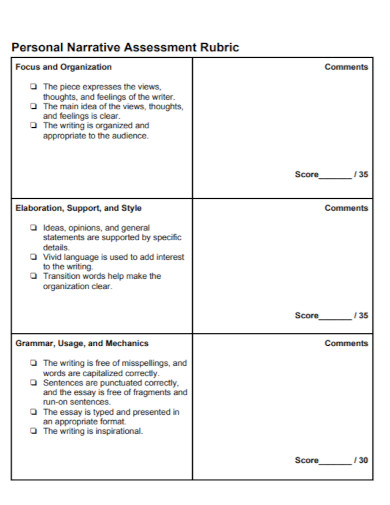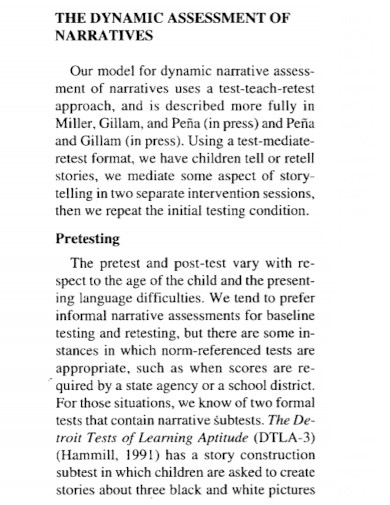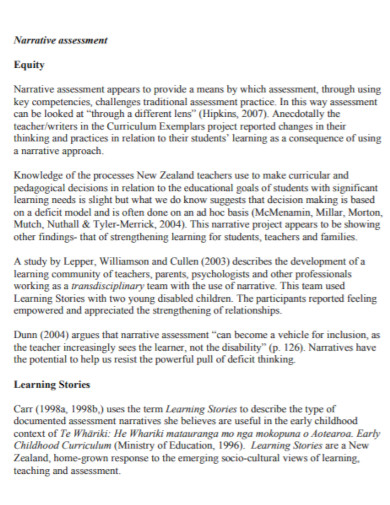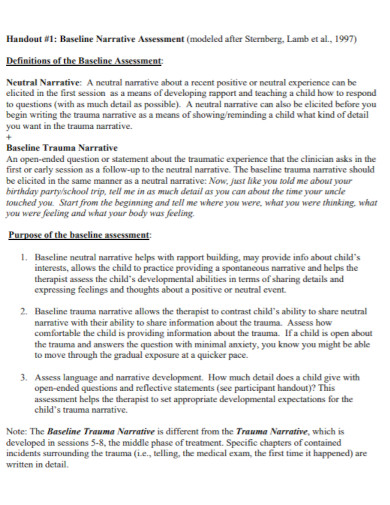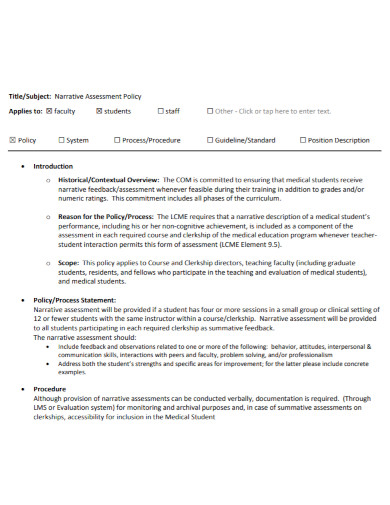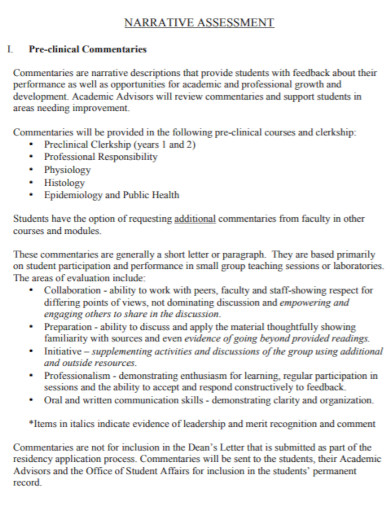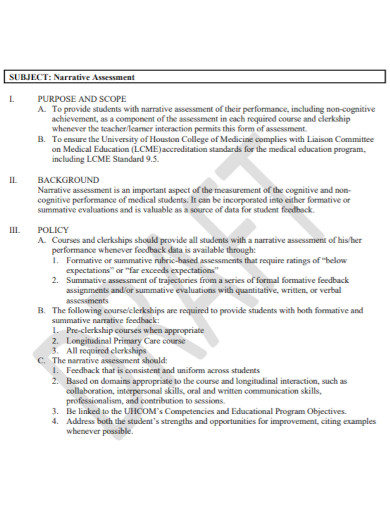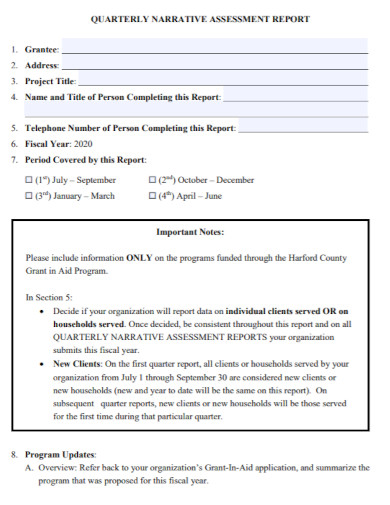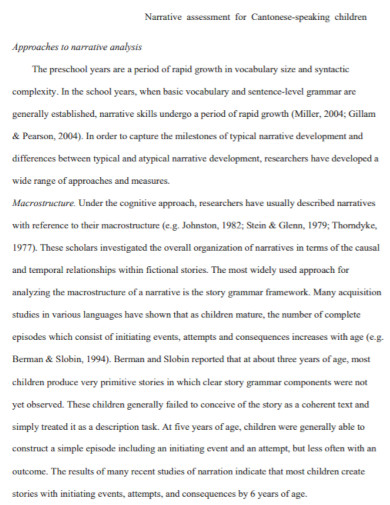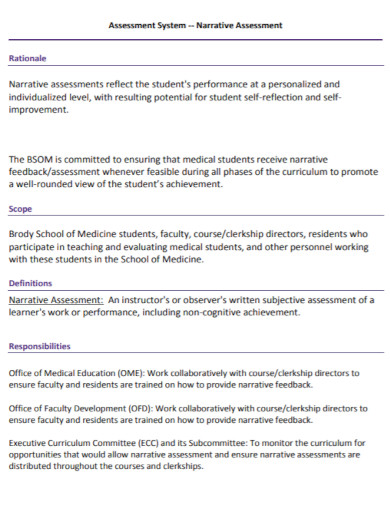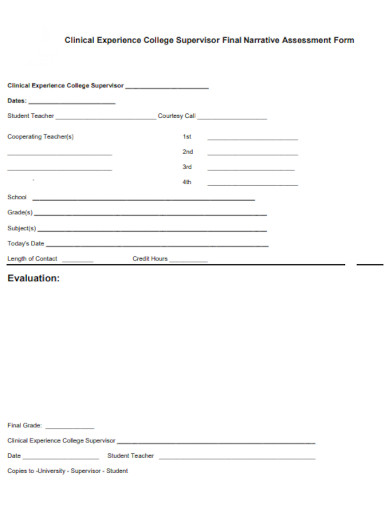10+ Narrative Assessment Examples to Download
Writing assessments for work, for school or simply for medical reasons is quite common these days. Not only are they easy to use and easy to evaluate for future references, they are also quite useful for a quick evaluation of students, children or basically anyone at all. Writing up a good narrative assessment may take some time when you have no clue where to begin. But that issue could be solved with some good guidelines to help you out. Check out the article below. Complete with definitions, tips, purpose, importance and examples. So the next time you are planning on writing a narrative assessment, why don’t you check this article out.
10+ Narrative Assessment Examples
1. Narrative Assessment Template
2. Dynamic Narrative Assessment
3. Equity Narrative Assessment
4. Baseline Narrative Assessment
5. Narrative Assessment Policy
6. Clinical Narrative Assessment
7. College Narrative Assessment
8. Quarterly Narrative Assessment
9. Children Narrative Assessment
10. Narrative Assessment System
11. Supervisor Narrative Assessment
Definition of Narrative
A narrative is a story. The act of telling a story in the form of a narrative. An oral or written document that describes a series of events in the form of a story. The process of writing or speaking about what happened by explaining using a narrative. A narrative is a way of explaining or giving your representation of the events that you witnessed, heard or experienced in the form of a story. The process of relating to someone what happened through a series of events that you may have experienced or witnessed. A certain way of telling a story.
Definition of Assessment
An assessment is an examination. A written examination to evaluate a person. The process of evaluating an individual through their knowledge, skills, and value. To examine a person before giving the final verdict. To judge someone by means of giving them an examination. The act of giving judgement after examining the result of the assessment, to see if the person or the individual still possess the right attitude and performance they are expected to have. To assess a person through a series of tests and evaluate their answers in the criteria based on their performance. For you to know a person’s performance, you must do an assessment.
Definition of Narrative Assessment
A narrative assessment is a type of evaluation that describes an individual’s learning and wellness. It allows the assessor to know just how far the student has progressed. In addition to that, it also helps understand the key points and the points where the individual needs to improve on. Not only that, it also helps the assessor to get to know the learner at a more academic level. Writing the narrative assessment to assess the student can also be used as a stepping stone to improving a student’s way of thinking.
Importance of a Narrative Assessment
The importance of writing a narrative assessment is to assess the important moments. To write down all the achievements and the milestones of your students. To highlight their strengths and to improve on their weaknesses. A narrative assessment also lets the students’ see the achievements and for the teacher or the assessor to see proof of the examination being given. To write down a student’s performance whether it is a positive or negative performance.
Tips for Writing a Narrative Assessment
Regardless if you are a student in college who is told to write a narrative assessment, or a teacher who wants to write a narrative assessment for their student, you can surely admit that writing one can sometimes be difficult. Especially when you have no idea where to begin and how to begin. You have the idea, but you are looking for a way to write it. If you are still wondering how, check out the following tips that would surely help you. As you begin writing your narrative assessment, look at the few tips down below.
- Draft your work – What better way to begin writing than to draft out what you want to write? Drafting your work can also help you rearrange your ideas and thoughts. As well as being able to know which idea you are going to use and which idea you are going to explain.
- Avoid using difficult words – I want you to think of whom you are writing the assessment for. If you are writing your assessment for a kid, avoid having to use words they may not understand. This is also to avoid misinterpretation.
- Avoid sugar coating – Not only is this unprofessional, it also means you are hiding the truth from your students by sugar coating. Avoid having to do this. You can revise how you would word it but do not use flowery language or sugar coating to state something.
- Write your final work down – Once you are done drafting and you are satisfied with your work, write the final output. Don’t forget to explain your ideas and the results of your assessment.
- Revise and send – You are done with your final output. But revising it won’t hurt anyone. Check to see if your tone of voice is professional and active. Check to see that your words and languages fit the age range of your students or patients.
FAQs
Are narrative assessments useful?
Yes, narrative assessments are very useful when you want to write down the results of the assessments given to students or patients.
Is there a minimum word count when writing a narrative assessment?
There is no minimum word count but the maximum word count should be around 1,000 words. This contains the introduction to your narrative assessment, followed by the examination, the result and evaluation. Lastly, the concluding statement.
What is the narrative assessment about?
When you write your narrative assessment, you are simply writing about the milestones you have seen from your students or patients. Their strengths, weaknesses and the improvements they have shown.
To whom is the narrative assessment for?
Students, patients, basically anyone can take an assessment. The narrative assessment is written down by the assessor.
There you have it. How to write a narrative assessment in simple steps. As well as the things to avoid when writing one. The next time you are going to be writing, the tips would surely be of help for you.


![10+ Narrative Assessment Examples [ College, Children, Clinical ]](https://images.examples.com/wp-content/uploads/2021/07/10-Narrative-Assessment-Examples-College-Children-Clinical-.jpg)
